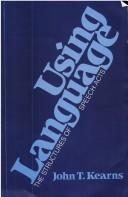| Listing 1 - 10 of 535 | << page >> |
Sort by
|
Book
Year: 1979 Publisher: Ghent: Communication and cognition,
Abstract | Keywords | Export | Availability | Bookmark
 Loading...
Loading...Choose an application
- Reference Manager
- EndNote
- RefWorks (Direct export to RefWorks)
Book
Year: 1979 Publisher: Ghent : Communication & Cognition,
Abstract | Keywords | Export | Availability | Bookmark
 Loading...
Loading...Choose an application
- Reference Manager
- EndNote
- RefWorks (Direct export to RefWorks)

ISBN: 087395808X Year: 1984 Publisher: Albany State university of New York press
Abstract | Keywords | Export | Availability | Bookmark
 Loading...
Loading...Choose an application
- Reference Manager
- EndNote
- RefWorks (Direct export to RefWorks)
Book
Year: 2013 Publisher: Łódź : Wydawnictwo Uniwersytetu Łódzkiego,
Abstract | Keywords | Export | Availability | Bookmark
 Loading...
Loading...Choose an application
- Reference Manager
- EndNote
- RefWorks (Direct export to RefWorks)
From speech acts to speech actions- and back' outlines recent developments in speech act theory (and pragmatics). It ties together many strands from classical thinking and earlier conceptions, with a new view on how speech theory could be further developed. I am impressed by the width and depth of the author's knowledge and insight - on many occasions I found myself overtaken by her considerations, such as when she deftly combines my concept of the pragmeme with the independently developed notion of the 'meme'. I find chapter five (and the entire book for that matter) extremely well researched and well-written. It will be suitable as a text in postgraduate and graduate courses, but will also stand out as an independent an important theoretical contribution.
Book
ISBN: 9781138224674 9781315401768 9781315401775 9781315401751 9781315401782 Year: 2017 Publisher: London ; New York : Routledge,
Abstract | Keywords | Export | Availability | Bookmark
 Loading...
Loading...Choose an application
- Reference Manager
- EndNote
- RefWorks (Direct export to RefWorks)
First published in 1985, this book aims to develop an approach to speech acts that has the virtue of being straight-forward, explicit, formal and flexible enough to accommodate many of the more general problems of interactive verbal communication. The first chapter introduces situation semantics with the second addressing the assumptions implied by the problem of representing speaker intentionality. The third chapter presents a streamlined theory of speech acts and the fourth tests the predictions of the theory in several hypothetical discourse situations. A summary and suggestions for further research is provided in chapter five, and appendices facilitate reference to key concepts.
Book
Year: 1979 Publisher: Ghent, Belgium : Communication & Cognition,
Abstract | Keywords | Export | Availability | Bookmark
 Loading...
Loading...Choose an application
- Reference Manager
- EndNote
- RefWorks (Direct export to RefWorks)
Book
ISBN: 183974572X Year: 2020 Publisher: [Place of publication not identified] : Barakaldo,
Abstract | Keywords | Export | Availability | Bookmark
 Loading...
Loading...Choose an application
- Reference Manager
- EndNote
- RefWorks (Direct export to RefWorks)
Book
ISBN: 9780823298402 0823298396 9780823298396 082329840X 0823298426 1531500528 Year: 2021 Publisher: New York, N.Y.: Fordham university press,
Abstract | Keywords | Export | Availability | Bookmark
 Loading...
Loading...Choose an application
- Reference Manager
- EndNote
- RefWorks (Direct export to RefWorks)
Class Acts examines two often neglected aspects of Jacques Derrida’s work as a philosopher, his public presentations at lectures and conferences and his teaching, along with the question of the “speech act” that links them. What, Michael Naas asks, is one doing when one speaks in public in these ways?The book follows Derrida’s itinerary with regard to speech act theory across three public lectures, from 1971 to 1997, all given, for reasons the book seeks to explain, in Montreal. In these lectures, Derrida elaborated his critique of J. L. Austin and his own subsequent redefinition of speech act theory. The book then gives an overview of Derrida’s teaching career and his famous “seminar” presentations, along with his own explicit reflections on pedagogy and educational institutions beginning in the mid-1970s. Naas then shows through a reading of three recently published seminars—on life death, theory and practice, and forgiveness—just how Derrida the teacher interrogated and deployed speech act theory in his seminars. Whether in a conference hall or a classroom, Naas demonstrates, Derrida was always interested in the way spoken or written words might do more than simply communicate some meaning or intent but might give rise to something like an event. Class Acts bears witness to the possibility of such events in Derrida’s work as a pedagogue and a public intellectual.

ISBN: 3760904823 Year: 1979 Publisher: Köln : Pahl-Rugenstein,
Abstract | Keywords | Export | Availability | Bookmark
 Loading...
Loading...Choose an application
- Reference Manager
- EndNote
- RefWorks (Direct export to RefWorks)
Book
ISBN: 5354000475 Year: 2002 Publisher: Moskva : Ėditorial URSS,
Abstract | Keywords | Export | Availability | Bookmark
 Loading...
Loading...Choose an application
- Reference Manager
- EndNote
- RefWorks (Direct export to RefWorks)
| Listing 1 - 10 of 535 | << page >> |
Sort by
|

 Search
Search Feedback
Feedback About UniCat
About UniCat  Help
Help News
News